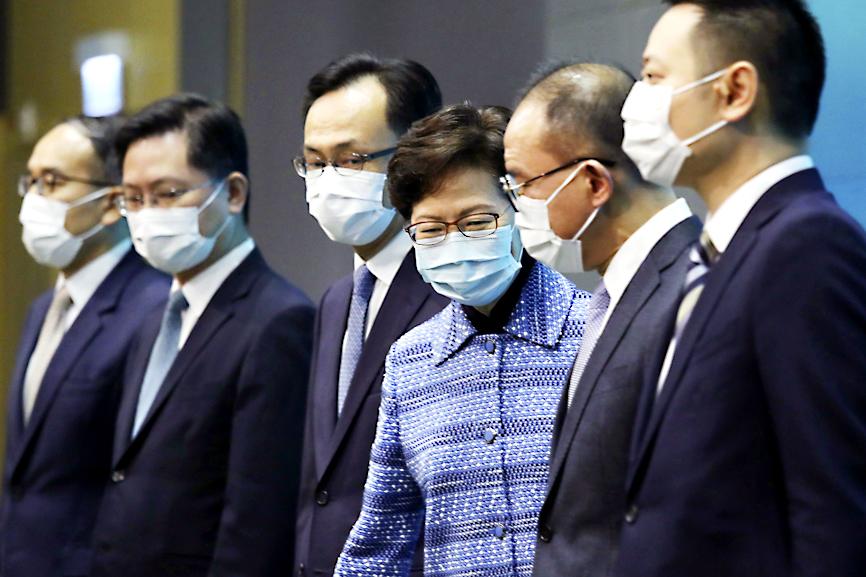Hong Kong Chief Executive Carrie Lam (林鄭月娥) yesterday replaced five senior officials, including the official overseeing ties with Beijing, in the biggest Cabinet reshuffle since hundreds of thousands of demonstrators took to the streets last year demanding her resignation.
Lam named Hong Kong Director of Immigration Erick Tsang (曾國衛) to replace Patrick Nip (聶德權) as Hong Kong secretary for constitutional and mainland affairs and appointed Nip as secretary for the civil service — two agencies at the center of Beijing’s demands for greater political loyalty from the former British colony.
The heads of the Financial Services and the Treasury Bureau, the Innovation and Technology Bureau, and the Home Affairs Bureau were also replaced.

Photo: AP
Lam told a news conference that she hoped the changes would help lay the ground for the territory’s recovery from a year of protests and pandemic.
“This reshuffle is aimed at taking us forward,” Lam said.
The appointments were announced earlier by Xinhua news agency, which said that the Chinese State Council had approved the nominations, as required for all top positions in Hong Kong.
The move comes as the territory tackles a second wave of COVID-19 cases while trying to soften the pandemic’s blow to the economy.
Hong Kong has also been battered into recession by the US-China trade dispute, and months of historically large and often violent protests that erupted in opposition to Lam’s effort to allow the transfer of criminal suspects to the mainland.
While Lam has said her government deserves the blame for the “entire unrest,” Chinese President Xi Jinping (習近平) has continued to back her and she has refused calls to resign.
Lam’s approval has risen from historic lows in part due to her early success in managing the coronavirus outbreak, with 18 percent supporting her in a Hong Kong Public Opinion Research Institute survey released on Tuesday, compared with 9.1 percent in February.
The reshuffle follows Xi’s own shakeup of the agencies that oversee Hong Kong, which was guaranteed a “high degree of autonomy” after its return to Chinese rule in 1997.
Nip apologized earlier this week for causing “confusion” and “misunderstanding” with a series of contradictory news releases from the Hong Kong Constitutional and Mainland Affairs Bureau attempting to explain a claim by the Hong Kong Liaison Office that it has the authority to supervise Hong Kong’s local affairs.
Meanwhile, his replacement, Tsang, received fresh scrutiny for giving a recent interview with a portrait of Xi over his shoulder.
Under Tsang’s watch, the immigration department in 2018 denied a visa renewal for Financial Times journalist Victor Mallet after he hosted an event at the Foreign Correspondents’ Club featuring the founder of a banned pro-independence party.
Lam said that reshuffle was “completely and entirely unrelated” to recent events.
She deflected a question about the Xi portrait, saying Tsang was chosen because of his capabilities.

CHAOS: Iranians took to the streets playing celebratory music after reports of Khamenei’s death on Saturday, while mourners also gathered in Tehran yesterday Iranian Supreme Leader Ayatollah Ali Khamenei was killed in a major attack on Iran launched by Israel and the US, throwing the future of the Islamic republic into doubt and raising the risk of regional instability. Iranian state television and the state-run IRNA news agency announced the 86-year-old’s death early yesterday. US President Donald Trump said it gave Iranians their “greatest chance” to “take back” their country. The announcements came after a joint US and Israeli aerial bombardment that targeted Iranian military and governmental sites. Trump said the “heavy and pinpoint bombing” would continue through the week or as long

TRUST: The KMT said it respected the US’ timing and considerations, and hoped it would continue to honor its commitments to helping Taiwan bolster its defenses and deterrence US President Donald Trump is delaying a multibillion-dollar arms sale to Taiwan to ensure his visit to Beijing is successful, a New York Times report said. The weapons sales package has stalled in the US Department of State, the report said, citing US officials it did not identify. The White House has told agencies not to push forward ahead of Trump’s meeting with Chinese President Xi Jinping (習近平), it said. The two last month held a phone call to discuss trade and geopolitical flashpoints ahead of the summit. Xi raised the Taiwan issue and urged the US to handle arms sales to

BIG SPENDERS: Foreign investors bought the most Taiwan equities since 2005, signaling confidence that an AI boom would continue to benefit chipmakers Taiwan Semiconductor Manufacturing Co’s (TSMC, 台積電) market capitalization swelled to US$2 trillion for the first time following a 4.25 percent rally in its American depositary receipts (ADR) overnight, putting the world’s biggest contract chipmaker sixth on the list of the world’s biggest companies by market capitalization, just behind Amazon.com Inc. The site CompaniesMarketcap.com ranked TSMC ahead of Saudi Aramco and Meta Platforms Inc. The Taiwanese company’s ADRs on Tuesday surged to US$385.75 on the New York Stock Exchange, as strong demand for artificial intelligence (AI) applications led to chip supply constraints and boost revenue growth to record-breaking levels. Each TSMC ADR represents

Pro-democracy media tycoon Jimmy Lai’s (黎智英) fraud conviction and prison sentence were yesterday overturned by a Hong Kong court, in a surprise legal decision that comes soon after Lai was jailed for 20 years on a separate national security charge. Judges Jeremy Poon (潘兆初), Anthea Pang (彭寶琴) and Derek Pang (彭偉昌) said in the judgement that they allowed the appeal from Lai, and another defendant in the case, to proceed, as a lower court judge had “erred.” “The Court of Appeal gave them leave to appeal against their conviction, allowed their appeals, quashed the convictions and set aside the sentences,” the judges